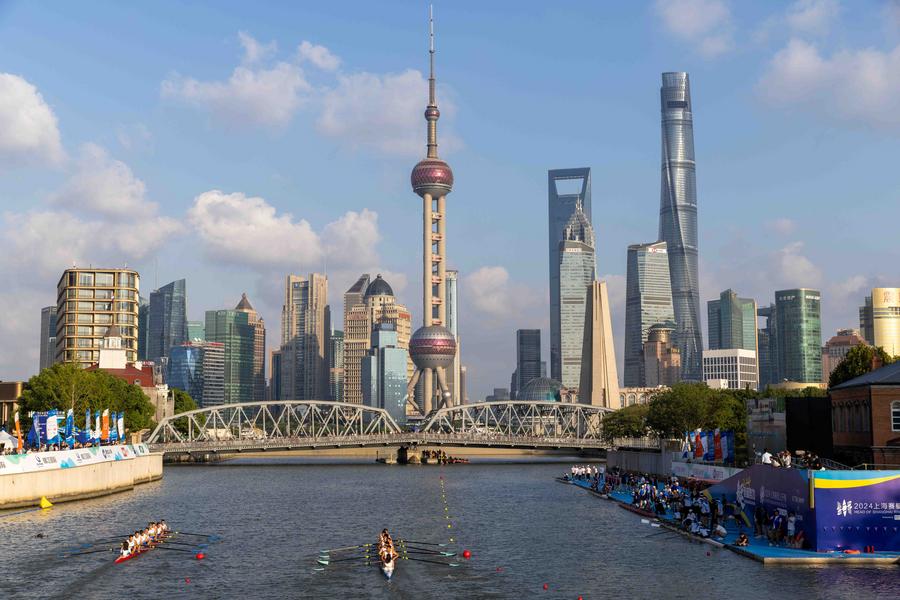


Participants compete during the 2024 Head of Shanghai River Regatta in Shanghai, east China, Sept. 28, 2024. (Xinhua/Wang Xiang)
China has made historic strides in its national economy, leading the world in manufacturing and trade. For many consecutive years, it has contributed over 30 percent to global economic growth.
by Rania Aboelkheir
On Oct. 1, the People's Republic of China will celebrate its diamond jubilee, marking the 75th anniversary of its founding. Over these 75 years, China has undergone numerous major transformations, evolving into a pioneering model of development across various fields. It has risen from one of the world's poorest nations to an industrial and commercial powerhouse, now holding the position of the world's second-largest economy.
The secret to China's success lies in its unique political system, anchored by the National People's Congress (NPC), the highest state authority in China. This year, China celebrated the 70th anniversary of the founding of the NPC and its first session in September 1954. Today, the Congress plays a crucial role in navigating the major transformations China is undergoing, as well as those occurring globally. Its responsibilities include enacting necessary legislation for emerging sectors and updating existing laws to keep pace with developments.
At the same time, the system is "an entirely new political system that has grown from Chinese soil" and a great invention in the evolution of political institutions in human history, as emphasized by President Xi Jinping during this year's celebration of the founding of the NPC. In his address, he highlighted the importance of further shoring up confidence in the path, theory, system and culture of socialism with Chinese characteristics in developing a whole-process people's democracy.
As previously mentioned, China has made historic strides in its national economy, leading the world in manufacturing and trade. For many consecutive years, it has contributed over 30 percent to global economic growth.
During my first visit to China to participate in discussions on the strategic plans made by the third plenary session of the 20th Communist Party of China (CPC) Central Committee, which aimed at strengthening comprehensive reforms and advancing Chinese modernization, I was struck by the immense efforts China is making at all levels to preserve its achievements.

People visit Sanfangqixiang (Three Lanes and Seven Alleys), an ancient block, in Fuzhou, southeast China's Fujian Province, Oct. 6, 2022. (Xinhua/Zhou Yi)
Notably, China's dedication to preserving its rich cultural heritage while striving for technological advancement and environmental sustainability caught my attention. Furthermore, Chinese tech companies are making remarkable progress in offering more sustainable and effective solutions for the future. China has achieved significant milestones in the green and low-carbon transition, becoming a global leader in installed capacity for hydropower, wind energy, solar energy, and biomass energy.
All of this has been accomplished within the developmental vision of the CPC, which seeks to secure China's rightful place on the international and regional stage, in line with its historical heritage, economic strength, and political stability. This vision is also reflected in China's global strategy to foster worldwide security, stability, and development for all. China is now a strategic partner to over 120 countries and the world's second-largest destination for foreign direct investment.
China's achievements are not confined to its own borders, as it has extended its vision to global development partnerships, creating prosperity for all through the Belt and Road Initiative (BRI) and other initiatives like the Global Development Initiative, Global Security Initiative, and Global Civilization Initiative.
As a force contributing to global peace, stability, and progress, China is actively working to build a shared future for humanity. With its historic commitment to international peace, mutual respect in state relations, and respect for national sovereignty and independence, China has taken on more responsibilities in promoting global stability. As a permanent member of the United Nations Security Council, a major contributor to UN peacekeeping efforts, and a supporter of conflict prevention and capacity building, China is playing an increasingly stronger role in enhancing global stability.
In tandem with China's diamond jubilee celebrations, Egypt and China are marking a decade since signing their comprehensive strategic partnership agreement. The Global Forum for Future Studies, of which I serve as secretary-general, recently organized a successful seminar in cooperation with the Chinese Embassy in Egypt to celebrate ten years of partnership between the two nations. Under the joint leadership of Egyptian President Abdel-Fattah al-Sisi and Chinese President Xi Jinping, bilateral relations have flourished over the past decade. The two leaders, through their high-level exchanges, have helped shape a comprehensive alignment between China's development vision, as embodied in the BRI, and Egypt's Vision 2030.
Editor's note: Rania Aboelkheir is the secretary-general of the Global Forum for Future Studies, an Egyptian think tank.
The views expressed in this article are those of the author and do not necessarily reflect the positions of Xinhua News Agency.■
点击右上角![]() 微信好友
微信好友
 朋友圈
朋友圈

请使用浏览器分享功能进行分享
